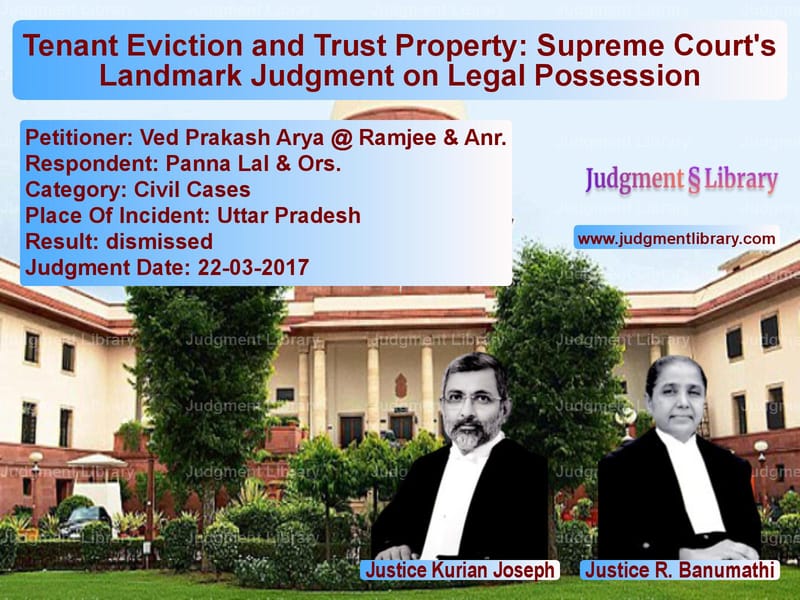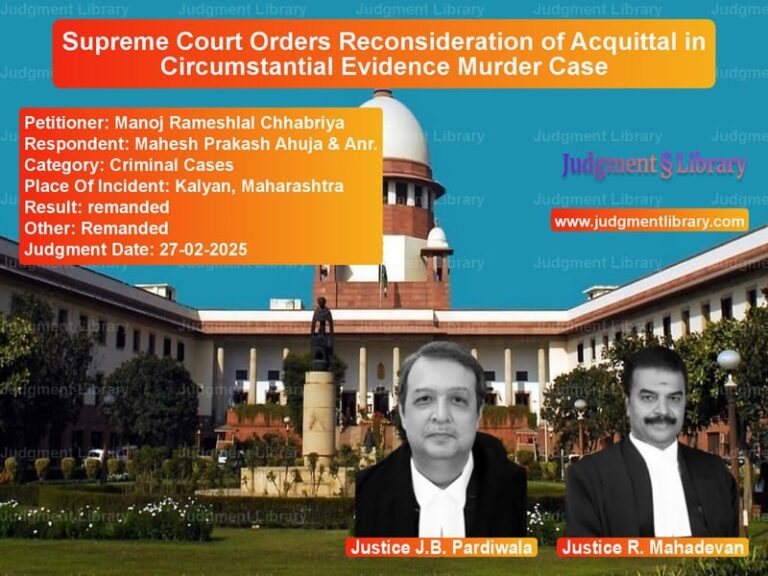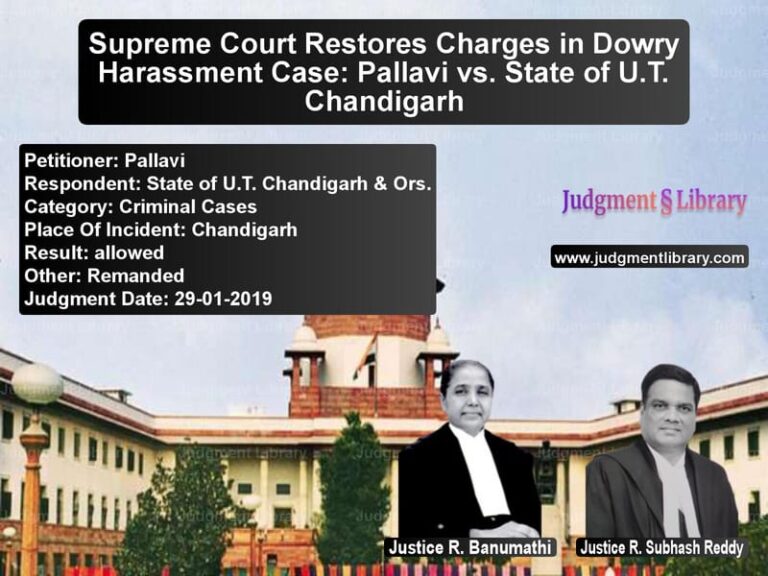Tenant Eviction and Trust Property: Supreme Court’s Landmark Judgment on Legal Possession
The case of Ved Prakash Arya @ Ramjee & Anr. v. Panna Lal & Ors. presented a crucial legal question regarding the eviction of tenants and the applicability of the Uttar Pradesh Urban Buildings (Regulation of Letting, Rent & Eviction) Act, 1972. The appellants, tenants in the disputed property, sought relief from eviction on the basis that the property belonged to a trust and was therefore not governed by the 1972 Act. The respondents, on the other hand, asserted their right to reclaim possession of the premises. The matter reached the Supreme Court after the appellants were unsuccessful before the High Court.
On March 12, 2004, the Supreme Court issued a notice stating:
“Issue notice to the respondents to show cause as to why all the proceedings be not set aside in view of the Uttar Pradesh Urban Buildings (Regulation of Letting, Rent & Eviction) Act No. 13 of 1972 being not applicable to trust property.”
However, after extensive deliberations, the Supreme Court ruled that the legal question raised did not require examination in the particular facts of this case. Instead, the Court proceeded to structure an orderly exit for the tenants by granting them a specified period to vacate the premises.
Background of the Case
The appellants were tenants under the respondents and had been residing in the premises for an extended period. After a legal dispute, the High Court ruled against the appellants, affirming their eviction. The appellants challenged this decision in the Supreme Court, arguing that the 1972 Act did not apply to trust property and that the eviction proceedings were consequently unlawful.
The respondents, on the other hand, maintained that the tenants had overstayed their legal right to occupancy and that the court orders for eviction must be upheld.
Petitioners’ Arguments
The appellants, represented by their legal counsel, put forward the following arguments:
- The property in question was a trust property, and as such, it was exempt from the provisions of the 1972 Act.
- The eviction proceedings initiated against them were therefore unlawful, as the High Court had misapplied the governing law.
- They had a legal right to retain possession of the premises, and the eviction orders should be set aside.
Respondents’ Counterarguments
The respondents, opposing the appellants’ claims, made the following contentions:
- The tenants had continued to occupy the premises well beyond the stipulated rental period and were thus legally bound to vacate.
- The High Court had already ruled in favor of the respondents, and there was no valid legal basis for further delaying the eviction.
- The Supreme Court should uphold the eviction order and ensure the tenants complied with it.
Supreme Court’s Judgment
The Supreme Court, comprising Justices Kurian Joseph and R. Banumathi, made the following rulings:
- The appeal was dismissed, thereby affirming the lower court’s ruling that the appellants had no legal right to retain possession.
- The appellants were granted time up to June 30, 2018, to surrender vacant and peaceful possession of the premises to the respondents.
- The appellants were required to file an undertaking before the Court within four weeks of the judgment.
- The appellants were ordered to continue paying rent for the use and occupation of the premises until their final departure.
- Failure to comply with the undertaking could result in contempt proceedings before the Supreme Court.
Key Legal Takeaways
This judgment establishes several important legal principles:
- Exemption of Trust Property: While the appellants raised an argument regarding the exemption of trust property from the 1972 Act, the Supreme Court determined that the specific facts of the case did not require an examination of this issue.
- Tenant Eviction: Courts are empowered to order eviction and provide tenants with a structured timeline to vacate the premises, rather than permitting indefinite occupation.
- Contempt of Court: Any violation of the Court’s undertaking could lead to serious legal consequences, including contempt proceedings.
Impact on Future Tenancy Disputes
This ruling serves as an important precedent for similar disputes involving tenants and trust properties. It clarifies that:
- Tenants cannot indefinitely delay eviction proceedings by challenging the applicability of tenancy laws.
- Courts may exercise discretion in granting tenants additional time to vacate, but they will not allow indefinite occupancy.
- Trust properties, while sometimes exempt from specific tenancy laws, are still subject to legal scrutiny when disputes arise.
Practical Implications for Tenants and Landlords
For tenants, this case underscores the importance of understanding the legal framework governing their occupancy. Raising procedural challenges to delay eviction may not always be successful, particularly when the courts prioritize the rights of property owners.
For landlords and property owners, this judgment reinforces the right to reclaim possession and the process that must be followed to enforce eviction orders.
Conclusion
The Supreme Court’s decision in Ved Prakash Arya @ Ramjee & Anr. v. Panna Lal & Ors. upholds the rule of law in tenancy matters. While the Court provided the appellants with time to vacate, it also affirmed the eviction order and made it clear that non-compliance could result in contempt proceedings. This judgment serves as a crucial reference for future tenancy disputes, ensuring that property rights are protected and that legal procedures are followed in eviction cases.
Don’t miss out on the full details! Download the complete judgment in PDF format below and gain valuable insights instantly!
Download Judgment: Ved Prakash Arya @ R vs Panna Lal & Ors. Supreme Court of India Judgment Dated 22-03-2017.pdf
Direct Downlaod Judgment: Direct downlaod this Judgment
See all petitions in Property Disputes
See all petitions in Landlord-Tenant Disputes
See all petitions in Judgment by Kurian Joseph
See all petitions in Judgment by R. Banumathi
See all petitions in dismissed
See all petitions in supreme court of India judgments March 2017
See all petitions in 2017 judgments
See all posts in Civil Cases Category
See all allowed petitions in Civil Cases Category
See all Dismissed petitions in Civil Cases Category
See all partially allowed petitions in Civil Cases Category







